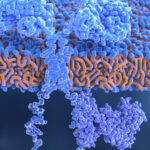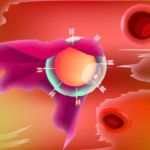A new report in ARD promises hope in an underserved disease, and more encouraging news on CAR T cells for lupus comes to hand.
The German team pioneering CD19-depleting CAR T-cell therapy in autoimmune diseases has reported more success, this time in a patient with systemic sclerosis.
This comes on top of previously reported trial successes in systemic lupus erythematosus and refractory antisynthetase syndrome.
In a letter published in the Annals of the Rheumatic Diseases, Professor Georg Schett and team presented a case study of a 60-year-old man with severe refractory systemic sclerosis.
At baseline, the patient had diffuse myocardial fibrosis, lung fibrosis, pulmonary hypertension, Raynaud’s phenomenon and carpal arthritis, and hadn’t responded to methotrexate or mycophenolate.
Six months after treatment, pulmonary fibrosis remained stable, and there were improvements in right ventricular strain, carpal arthritis and skin fibrosis, while Raynaud’s attacks were less frequent and less severe.
The treatment was well tolerated, with a mild fever after infusion (cytokine release syndrome grade 1).
“These data provide first evidence that CD19-targeting CAR T-cell treatment might be effective in severe SSc. The fast improvement of heart, joint and skin manifestations paralleled by seroconversion supports a central role of B cell-mediated autoimmunity in SSc,” wrote the authors.
However, they acknowledged that the conditioning therapy prior to CAR T cell infusion may have contributed to the benefits, and suggested future studies could include an arm with conditioning therapy only to determine its effect.
Meanwhile, the latest follow-up data on the team’s original cohort of SLE patients who received CD19-depleting CAR T-cell therapy is to be presented at EULAR 2023.
A total of seven patients, who had severe refractory SLE, were given a single CAR T-cell dose and went into disease remission after treatment, with the latest data showing all seven have maintained remission.
Results for the first five patients were presented by Professor Schett at ARA ASM 2022 and were subsequently published in Nature Medicine. These patients now have follow-up data ranging from 11 to 22 months. Two more patients have since been added to the cohort, with follow-ups of 4 months and 8 months.
“Taken together, these data suggest that CD19 CAR T-cell therapy can abrogate disease and delete autoimmunity in patients with severe SLE,” the authors wrote, adding that drug-free remission remains even if B cells recur.
Research into CAR T cell therapy for lupus is expanding to the US, where the FDA has given the go ahead for a phase I/II clinical trial of a similar CD19-CAR T cell therapy for patients with SLE and lupus nephritis.
Biotechnology company Cabaletta Bio, which has a translational research partnership with Professor Schett, announced that its CABA-201 CAR T-cell therapy has been granted fast track designation by the FDA and its investigational new drug application has been cleared.
An open-label clinical trial, using an equivalent dose to that used by Professor Schett’s team, will be conducted in six lupus nephritis patients and six patients who have SLE with no renal involvement.
In a press release from the company, chief medical officer Dr David Chang said: “Despite advances over the last few decades, treatment options for SLE remain inadequate. There are currently no curative options available that achieve durable disease remission.
“We believe the FDA’s decision to grant Fast Track Designation for CABA-201 underscores the unmet need for a treatment that has the potential to provide deep and durable responses for people living with lupus and potentially other autoimmune diseases where B cells contribute to disease.
“We look forward to initiating the phase 1/2 trial for CABA-201 and further evaluating its therapeutic potential for patients in need.”




